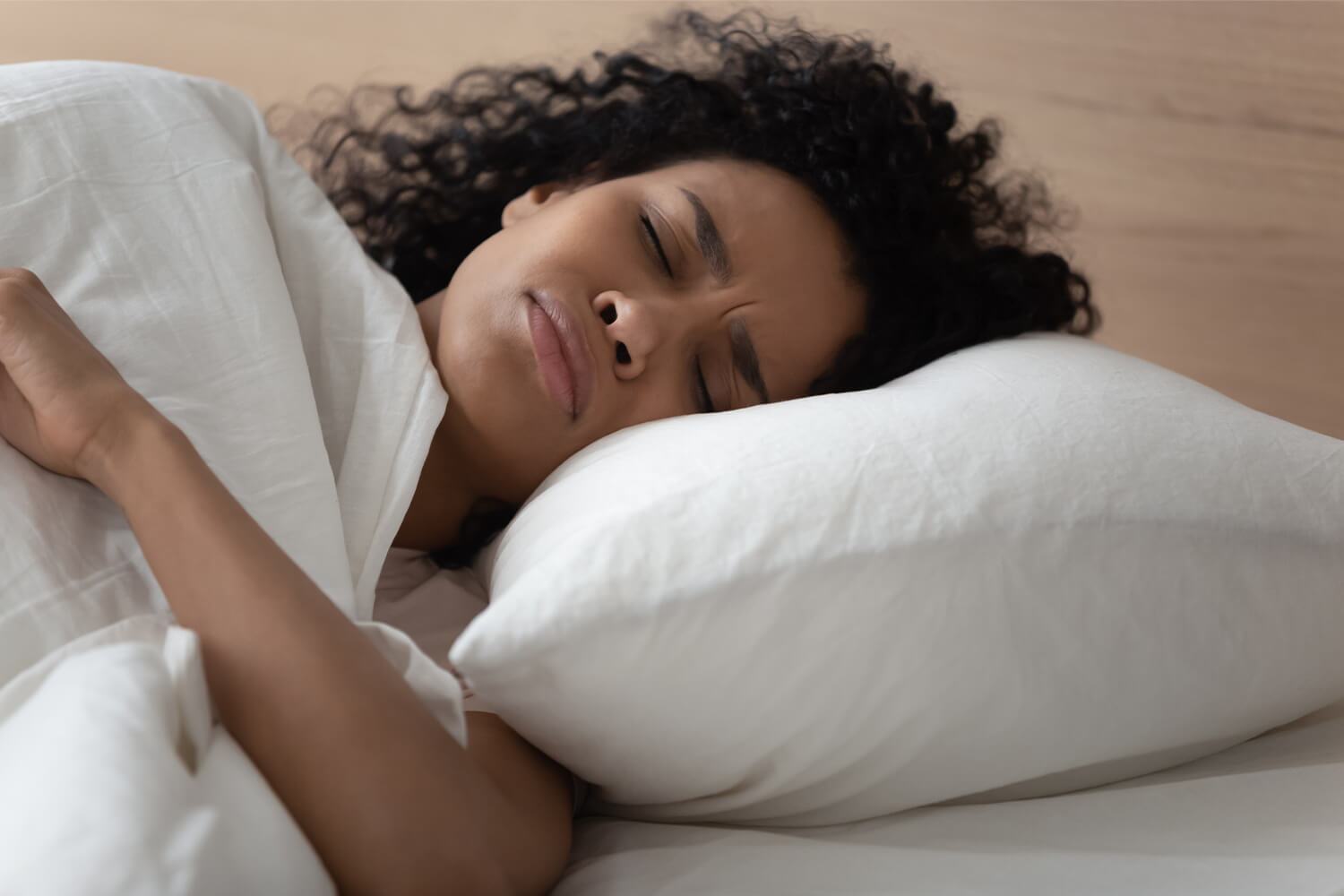Written by Ashley Kane,
Brightside Health
6 Minute Read

Medically reviewed by:
Jen Miller, PMHNP-BC
PMHNP Director
10 Minute Read

The term hypersomnia itself means excessive sleep, and this sleeping disorder is characterized by sleeping a reasonable amount each night yet still having a hard time waking up.
Hypersomnia causes you to constantly feel tired and sleepy regardless of how much sleep you get. Aside from excessive daytime sleepiness, hypersomnia also entails getting too much sleep such as 10 hours or more, or symptoms of “sleep drunkenness,” which causes you to feel groggy for long periods of time, extreme sleep inertia, and difficulties waking up with the use of alarm clocks.
Hypersomnia can also exist as a symptom of mental health conditions, including depression and anxiety. With depression in particular, the constant fatigue and difficulty waking up can both exacerbate and be exacerbated by feelings of hopelessness, anhedonia (not feeling joy or pleasure), and the chemical balances involved in depression.
If you’re experiencing symptoms of hypersomnia, it can be helpful to build a better understanding of what hypersomnia is so you can recognize whether or not hypersomnia may be a symptom of a mental health condition like depression or anxiety, and if you should seek professional help.
What is hypersomnia and what are the different types?
Hypersomnia is a medical term that is used to describe a variety of conditions that cause a person to feel excessively tired or to sleep for longer amounts of time than is recommended.
Hypersomnia is sometimes classified as either primary or secondary, where primary hypersomnia occurs on its own with no underlying cause, and secondary hypersomnia occurs as the result of another underlying health condition.
Primary hypersomnia
Primary hypersomnia is the medical term used to describe hypersomnia that occurs completely on its own rather than as a result of a medical condition.
There are four primary forms of hypersomnia disorders, including:
- Narcolepsy type 1: Narcolepsy type 1 is also often referred to as narcolepsy with cataplexy, and it is a chronic neurological disorder that can cause cataplexy (sudden muscle weakness), sleep paralysis, hallucinations, and hypersomnolence (excessive sleepiness).
- Narcolepsy type 2: Narcolepsy type 2 includes most of the same symptoms as narcolepsy type 1, but this type of narcolepsy does not include cataplexy and thus does not cause sudden muscle weakness. This type of narcolepsy also is not caused by insufficient levels of the neurotransmitter known as orexin, which is the main cause of narcolepsy type 1.
- Kleine-Levin syndrome: Kleine-Levin syndrome is characterized by recurrent episodes of hypersomnolence or excessive sleepiness, and these episodes take place alongside other symptoms including mental, behavioral, and psychiatric disturbances. Kleine-Levin syndrome primarily affects young males, and episodes of hypersomnolence generally decrease over a timespan of 8 to 12 years.
- Idiopathic hypersomnia: Idiopathic hypersomnia entails excessive sleepiness without cataplexy and which is also not refreshed by taking naps or getting more sleep, the affected individual may end up being diagnosed with idiopathic hypersomnia.
Secondary hypersomnia
Aside from the different types of primary hypersomnia, there are also different forms of secondary hypersomnia. In the case of secondary hypersomnia, your hypersomnia is being caused by some other underlying health condition, medications, substances, psychiatric disorders, or insufficient sleep syndrome.
The types of secondary hypersomnia are:
- Hypersomnia associated with a mental health disorder: Many mood disorders can also include hypersomnia as a symptom, including depression, anxiety, bipolar disorder, and seasonal affective disorder. Hypersomnia can affect how well a treatment may be able to work and how severe symptoms may be due to the functional impairment caused by excessive grogginess.
- Hypersomnia due to medical conditions: Some medical conditions that can lead to hypersomnia include Parkinson’s disease, epilepsy, hypothyroidism, multiple sclerosis, and obesity. Hypersomnia can also occur as the result of tumors, traumatic brain injuries, and diseases of the nervous system.
- Hypersomnia due to medications or substances: Hypersomnia can also be caused by certain sedating medications, alcohol, and drug use, and it can also be a symptom of withdrawal from stimulant drugs and some medications.
- Insufficient sleep syndrome: Insufficient sleep syndrome takes place when a person persistently fails to get sufficient sleep, and this is considered to be the most straightforward cause. Poor sleep hygiene or night shift work are two examples of causes of an inability to get sufficient amounts of sleep, and this can eventually lead to hypersomnia.
Of all of the different types of both primary and secondary hypersomnias, idiopathic hypersomnia is most commonly associated with the term hypersomnia, and it has no known cause.
Managing your symptoms: How can hypersomnia be treated?
If you are struggling with symptoms of hypersomnia, the right approach to treatment and symptom management for you will depend on the type of hypersomnia you are experiencing.
Many forms of secondary hypersomnia can be relieved when you start treatment for the health condition that is causing your hypersomnia, but primary hypersomnias may be more difficult to manage. However, there are treatment options for both types of narcolepsy as well as Kleine-Levin syndrome.
There is not yet any form of FDA-approved treatment for idiopathic hypersomnia, but several forms of treatment that have been approved for use in the treatment of narcolepsy may also be effective at treating and managing idiopathic hypersomnia.
Some research has found that behavioral approaches may be effective for treating symptoms of idiopathic hypersomnia, and these approaches include cognitive behavioral therapy and other methods of coping skills.
Using behavioral interventions to help regularize nighttime and daytime sleep can also be helpful, and treating coexisting circadian abnormalities may make a difference since your circadian rhythm helps regulate and normalize your sleep.
There are also three major classes of medications that have been approved for treatment of daytime sleepiness caused by narcolepsy, and these medications may be effective for the treatment of idiopathic hypersomnia, too. These classes of medications are stimulant medications, non-stimulant wake-promoting medications, and sodium oxybate.
However, if your symptoms are caused by mental health conditions, antidepressant medication can be a safer alternative than these stimulants. Seeking professional help for that condition can also help to address symptoms of hypersomnia. Antidepressants and other mental health medications can work as part of a comprehensive, personalized treatment plan that can help you feel like (and sleep like) yourself again.
If you think there may be a mental health disorder behind your sleep troubles, Brightside can help—start with a free assessment here.
The bottom line
Those who are struggling with hypersomnia may experience severe symptoms that greatly interfere with their ability to complete daily tasks and activities.
Excessive daytime sleepiness, sleeping for too long, and constantly feeling groggy and tired are all common symptoms of hypersomnia, and there are both primary and secondary forms of hypersomnia. Idiopathic hypersomnia is one form of primary hypersomnia, and it has no known cause, nor does it have any FDA-approved treatments thus far.
However, some treatments that have been approved for the treatment of narcolepsy may also prove to be effective for the treatment of idiopathic hypersomnia, and if you think you are struggling with hypersomnia, you should reach out to a healthcare professional for guidance.













